Fleurs du Mal Magazine


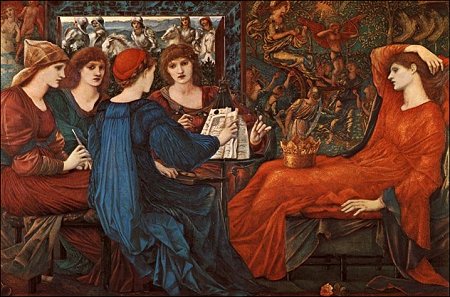
Algernon Charles Swinburne
(1837-1909)
In the water
The sea is awake, and the sound of the song
of the joy of her waking is rolled
From afar to the star that recedes, from anear
to the wastes of the wild wide shore.
Her call is a trumpet compelling us homeward:
if dawn in her east be acold,
From the sea shall we crave not her grace to rekindle
the life that it kindled before,
Her breath to requicken, her bosom to rock us,
her kisses to bless as of yore?
For the wind, with his wings half open, at pause
in the sky, neither fettered nor free,
Leans waveward and flutters the ripple to laughter
and fain would the twain of us be
Where lightly the wave yearns forward from under
the curve of the deep dawn’s dome,
And, full of the morning and fired with the pride
of the glory thereof and the glee,
Strike out from the shore as the heart in us bids
and beseeches, athirst for the foam.
Life holds not an hour that is better to live in:
the past is a tale that is told,
The future a sun-flecked shadow, alive and asleep,
with a blessing in store.
As we give us again to the waters, the rapture
of limbs that the waters enfold
Is less than the rapture of spirit whereby,
though the burden it quits were sore,
Our souls and the bodies they wield at their will
are absorbed in the life they adore–
In the life that endures no burden, and bows not
the forehead, and bends not the knee–
In the life everlasting of earth and of heaven,
in the laws that atone and agree,
In the measureless music of things, in the fervour
of forces that rest or that roam,
That cross and return and reissue, as I
after you and as you after me
Strike out from the shore as the heart in us bids
and beseeches, athirst for the foam.
For, albeit he were less than the least of them, haply
the heart of a man may be bold
To rejoice in the word of the sea as a mother’s
that saith to the son she bore,
Child, was not the life in thee mine, and my spirit
the breath in thy lips from of old?
Have I let not thy weakness exult in my strength,
and thy foolishness learn of my lore?
Have I helped not or healed not thine anguish, or made not
the might of thy gladness more?
And surely his heart should answer, The light
of the love of my life is in thee.
She is fairer than earth, and the sun is not fairer,
the wind is not blither than she:
From my youth hath she shown me the joy of her bays
that I crossed, of her cliffs that I clomb,
Till now that the twain of us here, in desire
of the dawn and in trust of the sea,
Strike out from the shore as the heart in us bids
and beseeches, athirst for the foam.
Friend, earth is a harbour of refuge for winter,
a covert whereunder to flee
When day is the vassal of night, and the strength
of the hosts of her mightier than he;
But here is the presence adored of me, here
my desire is at rest and at home.
There are cliffs to be climbed upon land, there are ways
to be trodden and ridden, but we
Strike out from the shore as the heart in us bids
and beseeches, athirst for the foam.

After a reading
For the seven times seventh time love would renew
the delight without end or alloy
That it takes in the praise as it takes in the presence
of eyes that fulfil it with joy;
But how shall it praise them and rest unrebuked
by the presence and pride of the boy?
Praise meet for a child is unmeet for an elder
whose winters and springs are nine
What song may have strength in its wings to expand them,
or light in its eyes to shine,
That shall seem not as weakness and darkness if matched
with the theme I would fain make mine?
The round little flower of a face that exults
in the sunshine of shadowless days
Defies the delight it enkindles to sing of it
aught not unfit for the praise
Of the sweetest of all things that eyes may rejoice in
and tremble with love as they gaze.
Such tricks and such meanings abound on the lips
and the brows that are brighter than light,
The demure little chin, the sedate little nose,
and the forehead of sun-stained white,
That love overflows into laughter and laughter
subsides into love at the sight.
Each limb and each feature has action in tune
with the meaning that smiles as it speaks
From the fervour of eyes and the fluttering of hands
in a foretaste of fancies and freaks,
When the thought of them deepens the dimples that laugh
in the corners and curves of his cheeks.
As a bird when the music within her is yet
too intense to be spoken in song,
That pauses a little for pleasure to feel
how the notes from withinwards throng,
So pauses the laugh at his lips for a little,
and waxes within more strong.
As the music elate and triumphal that bids
all things of the dawn bear part
With the tune that prevails when her passion has risen
into rapture of passionate art,
So lightens the laughter made perfect that leaps
from its nest in the heaven of his heart.
Deep, grave and sedate is the gaze of expectant
intensity bent for awhile
And absorbed on its aim as the tale that enthralls him
uncovers the weft of its wile,
Till the goal of attention is touched, and expectancy
kisses delight in a smile.
And it seems to us here that in Paradise hardly
the spirit of Lamb or of Blake
May hear or behold aught sweeter than lightens
and rings when his bright thoughts break
In laughter that well might lure them to look,
and to smile as of old for his sake.
O singers that best loved children, and best
for their sakes are beloved of us here,
In the world of your life everlasting, where love
has no thorn and desire has no fear,
All else may be sweeter than aught is on earth,
nought dearer than these are dear.
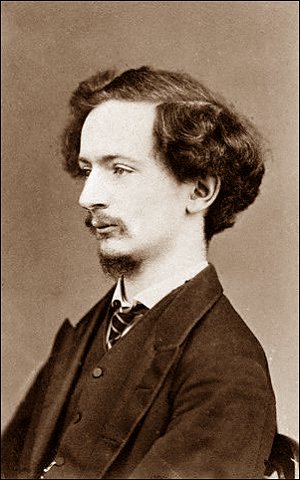
Love and scorn
I
Love, loyallest and lordliest born of things,
Immortal that shouldst be, though all else end,
In plighted hearts of fearless friend with friend,
Whose hand may curb or clip thy plume-plucked wings?
Not grief’s nor time’s: though these be lords and kings
Crowned, and their yoke bid vassal passions bend,
They may not pierce the spirit of sense, or blend
Quick poison with the soul’s live watersprings.
The true clear heart whose core is manful trust
Fears not that very death may turn to dust
Love lit therein as toward a brother born,
If one touch make not all its fine gold rust,
If one breath blight not all its glad ripe corn,
And all its fire be turned to fire of scorn.
II
Scorn only, scorn begot of bitter proof
By keen experience of a trustless heart,
Bears burning in her new-born hand the dart
Wherewith love dies heart-stricken, and the roof
Falls of his palace, and the storied woof
Long woven of many a year with life’s whole art
Is rent like any rotten weed apart,
And hardly with reluctant eyes aloof
Cold memory guards one relic scarce exempt
Yet from the fierce corrosion of contempt,
And hardly saved by pity. Woe are we
That once we loved, and love not; but we know
The ghost of love, surviving yet in show,
Where scorn has passed, is vain as grief must be.
III
O sacred, just, inevitable scorn,
Strong child of righteous judgment, whom with grief
The rent heart bears, and wins not yet relief,
Seeing of its pain so dire a portent born,
Must thou not spare one sheaf of all the corn,
One doit of all the treasure? not one sheaf,
Not one poor doit of all? not one dead leaf
Of all that fell and left behind a thorn?
Is man so strong that one should scorn another?
Is any as God, not made of mortal mother,
That love should turn in him to gall and flame?
Nay: but the true is not the false heart’s brother:
Love cannot love disloyalty: the name
That else it wears is love no more, but shame.
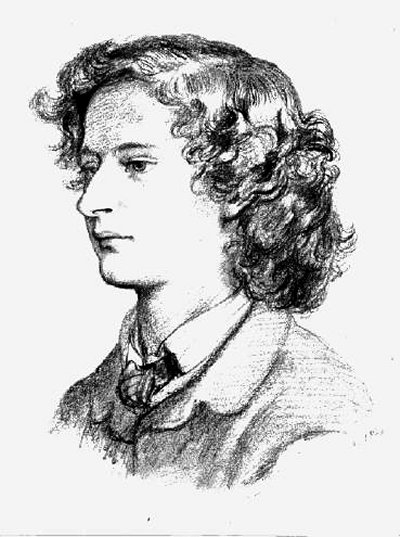
A solitude
Sea beyond sea, sand after sweep of sand,
Here ivory smooth, here cloven and ridged with flow
Of channelled waters soft as rain or snow,
Stretch their lone length at ease beneath the bland
Grey gleam of skies whose smile on wave and strand
Shines weary like a man’s who smiles to know
That now no dream can mock his faith with show,
Nor cloud for him seem living sea or land.
Is there an end at all of all this waste,
These crumbling cliffs defeatured and defaced,
These ruinous heights of sea-sapped walls that slide
Seaward with all their banks of bleak blown flowers
Glad yet of life, ere yet their hope subside
Beneath the coil of dull dense waves and hours?
First and last
Upon the borderlands of being,
Where life draws hardly breath
Between the lights and shadows fleeing
Fast as a word one saith,
Two flowers rejoice our eyesight, seeing
The dawns of birth and death.
Behind the babe his dawn is lying
Half risen with notes of mirth
From all the winds about it flying
Through new-born heaven and earth:
Before bright age his day for dying
Dawns equal-eyed with birth.
Equal the dews of even and dawn,
Equal the sun’s eye seen
A hand’s breadth risen and half withdrawn:
But no bright hour between
Brings aught so bright by stream or lawn
To noonday growths of green.
Which flower of life may smell the sweeter
To love’s insensual sense,
Which fragrance move with offering meeter
His soothed omnipotence,
Being chosen as fairer or as fleeter,
Borne hither or borne hence,
Love’s foiled omniscience knows not: this
Were more than all he knows
With all his lore of bale and bliss,
The choice of rose and rose,
One red as lips that touch with his,
One white as moonlit snows.
No hope is half so sweet and good,
No dream of saint or sage
So fair as these are: no dark mood
But these might best assuage;
The sweet red rose of babyhood,
The white sweet rose of age.
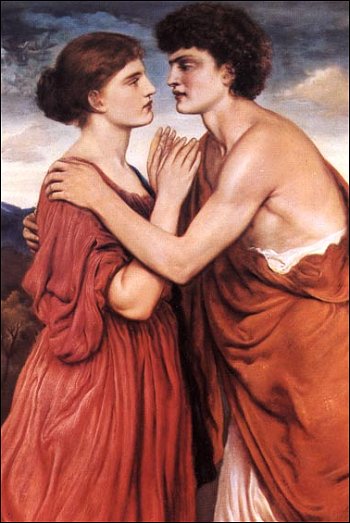
Algernon Charles Swinburne: Five Poems
kempis poetry magazine
More in: PRE-RAPHAELITES, Swinburne, Algernon Charles

Avant-gardes ’20-’60
Hoogtepunten uit de collectie van
het Stedelijk Museum te zien in het
Van Gogh Museum
26 juni t/m 23 augustus 2009
In de aanloop naar de heropening in het voorjaar van 2010 is het Stedelijk Museum van 26 juni tot en met 23 augustus 2009 opnieuw te gast in het Van Gogh Museum. De expositie Avant-gardes ‘20 / ‘60 toont hoogtepunten uit de collectie van het Stedelijk Museum uit de jaren ‘20 en de jaren ‘60 van de vorige eeuw: roerige decennia met veel verschuivingen, ook in de kunst. Deze jaren werden gekenmerkt door een grote experimenteerdrift binnen de beeldende kunst. Kunstenaars maakten grensverleggend werk, met nieuwe middelen. Zij beschouwden zich als de voorlopers en vernieuwers, of letterlijk als de ‘avant-garde’ van de beeldende kunst en van de maatschappij. Circa 70 belangrijke werken van onder meer Pablo Picasso, Piet Mondriaan, Kazimir Malevich, Luciano Fontana, Yves Klein, Roy Lichtenstein en Andy Warhol zijn te zien in de tentoonstellingsvleugel van het Van Gogh Museum.

Gerrit Rietveld: Roodblauwe stoel, 1918- 1923
Stedelijk Museum Amsterdam
Avant-gardes ‘20
In de jaren ‘20 speelde de avant-garde zich nog vrijwel exclusief in Europa af. Picasso, Mondriaan, Van Doesburg, Schwitters en Malevich behoren tot de belangrijkste vertegenwoordigers van de avant-garde van die tijd. Parijs bleef het centrum van de vernieuwingen dat het al sinds lang was, met onder meer het late kubisme van Picasso en het surrealisme van bijvoorbeeld Max Ernst. In West-Europa speelde Nederland een rol, waar in plaatsen als Leiden en Utrecht De Stijl bloeide. Maar ook in steden als Berlijn, Dessau en Hannover bestond met onder meer Dada en het Bauhaus een radicaal nieuw kunstbegrip. Veel verder naar het oosten, in Moskou en Leningrad, ontstonden revolutionaire stromingen die als Russisch constructivisme bekend staan.
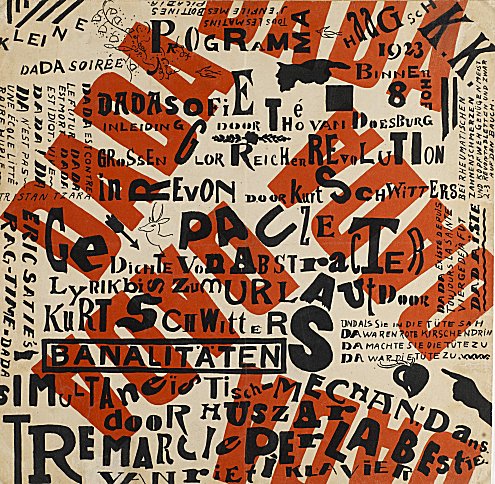
Theo van Doesburg: Affiche Kleine Dadasoirée, 1922
Stedelijk Museum Amsterdam
Avant-gardes ‘60
Veertig jaar later vonden belangrijke ontwikkelingen binnen de avant-garde juist ook in Amerika plaats, met name in New York en Los Angeles. In het land van de onbegrensde mogelijkheden ontstonden stromingen als pop art, minimal art en post-minimal art, met kunstenaars als Andy Warhol, Carl Andre en Robert Morris. In West-Europa bleef Parijs belangrijk, met vertegenwoordigers van het nouveau réalisme, en kwam het zakelijke vormgebruik van kunstenaarsgroepen Zero en Nul naar voren in Duitsland en Nederland. Steden waaronder Düsseldorf, Keulen en Amsterdam speelden hierin een belangrijke rol.
De rol van het Stedelijk Museum – Amsterdam vervulde na de Tweede Wereldoorlog een brugfunctie: veel Amerikaanse kunstenaars realiseerden hier hun eerste museale presentaties en wisten zo voet aan de grond in West-Europa te krijgen. Het Stedelijk Museum speelde daarbij veelal een verbindende rol en slaagde erin een toonaangevende collectie op te bouwen. Het merendeel van de getoonde werken was tot 5 jaar geleden dan ook vaak te zien in de vaste opstelling van het Stedelijk Museum.
Naar het nieuwe Stedelijk Museum – Het Stedelijk Museum wordt op dit moment gerenoveerd en uitgebreid met spectaculaire nieuwbouw van Benthem Crouwel Architekten. De heropening van het Stedelijk Museum staat gepland voor maart/april 2010. Tot die tijd beweegt het door Amsterdam met projecten en tentoonstellingen, onder de noemer Stedelijk in de Stad.

Kazimir Malevich: Suprematist painting (Rood kruis op zwarte cirkel), 1921-1927
Stedelijk Museum Amsterdam
fleursdumal.nl magazine – magazine for art & literature
More in: Andy Warhol, Bauhaus, Bauhaus, Constructivism, Constuctivisme, Dada, Dadaïsme, De Ploeg, De Stijl, Exhibition Archive, Expressionism, Futurism, Futurisme, Gerrit Rietveld, Kubisme, Modernisme, Piet Mondriaan, Surrealism, Surrealisme, Theo van Doesburg, Vincent van Gogh, Yves Klein, ZERO art

Cees van Raak
D r i e g e d i c h t e n
Zelfs de liefde kent een gezicht
Niets wees erop,
niets kondigde het aan.
Zo willekeurig, haast ongepast.
Verwonderd vroeg hij zich af
of het een teken van genade was,
of een proeve.
Waarom het hem overkwam,
waarom daar.
Hij had overal kunnen zijn,
iemand anders, iedere leeftijd
en hij zocht voorbeelden,
woorden om het vast te houden,
te vergelijken, te herinneren voor later.
Tevergeefs, niets leek erop,
niemand had aanleiding gegeven,
hijzelf niet in het minst.
De taal dwaalde, de tijd ontbrak
voor de man
midden in het bos.
De winkel
dit is de winkel
waar gedichten van
Wislawa Szymborska
fonkelen van plezier
ook te koop
een origineel strijkijzer
uit Raumschiff Orion
het is de winkel
waar het mooiste meisje
van de stad werkt
onlangs verliet
een verwarde
eenhoorn het pand
dankbaar uitgeleide
gedaan door
het meisje
dit is de winkel
vol magische onderonsjes

Elsje Christiaens
als een van de velen
zocht zij het geluk in Amsterdam
zij arriveerde op 28 april 1664
drie dagen later was zij
the talk of the town
wie had dat ooit gedacht
watervrees of niet voor
de 18-jarige Elsje Christiaens
voer de oude meester over het IJ
en de kunstenaar hoefde
haar zelfs niet op te tutten
met bont of japon of rafelkraag
zij was het ideale model
zo perfect zij zich aan hem toonde
daar op het galgenveld
en hoewel gewurgd en
de schedel ingeslagen
poseerde zij geduldig
voor eeuwige schoonheid
en het loonde
zij hangt sinds jaar en dag
in het Metropolitan Museum of Art
New York
als een echte Rembrandt

Cees van Raak (1954)
Stadsdichter van Tilburg 2009-2011
kemp=mag – kempis poetry magazine
More in: City Poets / Stadsdichters, Raak, Cees van

Victor Hugo
(1802-1885)
A un poète
Ami, cache ta vie et répands ton esprit.
Un tertre, où le gazon diversement fleurit ;
Des ravins où l’on voit grimper les chèvres blanches ;
Un vallon, abrité sous un réseau de branches
Pleines de nids d’oiseaux, de murmures, de voix,
Qu’un vent joyeux remue, et d’où tombe parfois,
Comme un sequin jeté par une main distraite,
Un rayon de soleil dans ton âme secrète ;
Quelques rocs, par Dieu même arrangés savamment
Pour faire des échos au fond du bois dormant ;
Voilà ce qu’il te faut pour séjour, pour demeure !
C’est là, – que ta maison chante, aime, rie ou pleure, –
Qu’il faut vivre, enfouir ton toit, borner tes jours,
Envoyant un soupir à peine aux antres sourds,
Mirant dans ta pensée intérieure et sombre
La vie obscure et douce et les heures sans nombre,
Bon d’ailleurs, et tournant, sans trouble ni remords,
Ton coeur vers les enfants, ton âme vers les morts !
Et puis, en même temps, au hasard, par le monde,
Suivant sa fantaisie auguste et vagabonde,
Loin de toi, par delà ton horizon vermeil,
Laisse ta poésie aller en plein soleil !
Dans les rauques cités, dans les champs taciturnes,
Effleurée en passant des lèvres et des urnes,
Laisse-la s’épancher, cristal jamais terni,
Et fuir, roulant toujours vers Dieu, gouffre infini,
Calme et pure, à travers les âmes fécondées,
Un immense courant de rêves et d’idées,
Qui recueille en passant, dans son flot solennel,
Toute eau qui sort de terre ou qui descend du ciel !
Toi, sois heureux dans l’ombre. En ta vie ignorée,
Dans ta tranquillité vénérable et sacrée,
Reste réfugié, penseur mystérieux !
Et que le voyageur malade et sérieux
Puisse, si le hasard l’amène en ta retraite,
Puiser en toi la paix, l’espérance discrète,
L’oubli de la fatigue et l’oubli du danger,
Et boire à ton esprit limpide, sans songer
Que, là-bas, tout un peuple aux mêmes eaux s’abreuve.
Sois petit comme source et sois grand comme fleuve.
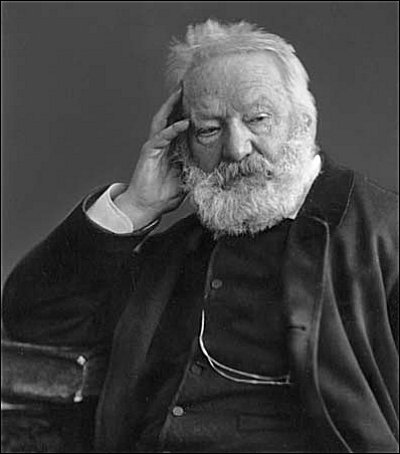

fleursdumal.nl magazine
More in: Archive G-H, Archive G-H, Hugo, Victor, Victor Hugo
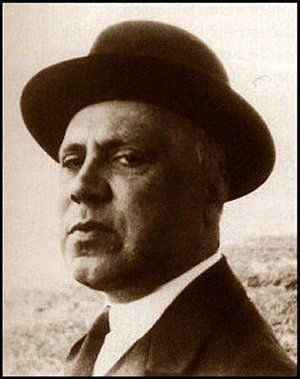
Willem de Mérode
(1887-1939)
Geluk
Toen zagen wij de wolken kruien
En wachtten door de zwoele dag
Het breken van de donderbuien
In regenvlaag en hagelslag.
En de avond daalde en geen vertroosten
Van koelte en geen verkwikken kwam.
Toen barstte ’s nachts het grommend oosten
In blauwe gloed en rode vlam.
Wij haalden onze adem ruimer
En zonken uit de lauwe druk
Tot Uwe grondeloze sluimer
En waakten klaar – is dát geluk?
De Roos
Rijk en luchthartig heeft de roos gebloeid.
Haar zijden prachtgewaad was snel versleten.
Van een berooid hart wil geen mens meer weten.
’t Verhaal van armoe heeft nog nooit geboeid.
Wie wandelt door een leeggewaaide hof?
Wie plukt zich een boeket van dode rozen?
Trots dorens wordt een jonge knop gekozen.
Men waagt zijn bloed niet voor dor hout en lof.
IJdel en droef was dit vervoerend blozen,
Ons nu ontslapen zorgen nutteloos.
En wie dit als zijn levenslust verkoos,
Heeft niets dan wonden en verdriet gekozen.
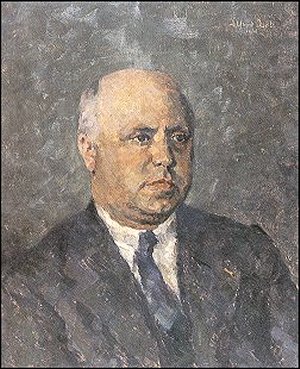
Het verdriet
Ik heb gewerkt, ik heb geleden,
Ik heb geworsteld met ‘t verdriet,
Ik heb gebogen als het riet,
en soms heb ik ‘t met laffe vlucht gemeden.
Nu stelt ‘t zich ondoordringbaar voor mijn staren
Als van de nacht het nevelig begin.
Maar als een lichtende lantaren
Hef ik U op en volg U ‘t duister in.
Verlangen
Ik heb zo lang op u gewacht
En nergens heil of heul gevonden.
Ergens lachte het zoet en zacht….
Ach, zonder u is alles zonde.
Ergens lachte het zoet en zacht…
Ik weet wel, dat ik blij zijn konde,
Als ik niet stadig u gedacht,
Ach, zonder u is alles zonde.
Had mijn verlangen maar de kracht
Dat ik u tot mij trekken konde.
Lichten uw ogen door de nacht?
Heb ik uw aangezicht gevonden?
… Ergens lachte het zoet en zacht…
Ach, zonder u is alles zonde!
Triestig
Ik denk: zo zal het later misschien zijn:
Jij hebt een huisgezin, een vrouw en zonen,
En ik zal nog als nu heel eenzaam wonen,
En deze eenzaamheid is als een wijn
Die men aan zieken schenkt om te versterken.
En nu en dan zul jij mij troosten komen
En mild je kracht in mij doen overstromen
En dagenlang zal ik de krachtstroom merken.
En als er, nog maar zelden, een gedicht
Ontstaat, stiller en met verzachte glansen,
Zullen er lichtjes in je ogen dansen,
En even is de wereld voor mij licht,
De wereld, reeds van ondergangen zwanger.
Ik ben zo moe, wat doe ik hier nog langer.
Willem de Mérode: Vijf gedichten
![]()
fleursdumal.nl magazine
More in: Archive M-N, Mérode, Willem de
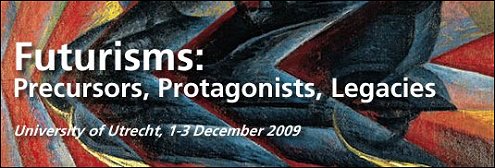
F u t u r i s m s :
Precursors, Protagonists, Legacies
International conference – University of Utrecht
1-3 December 2009
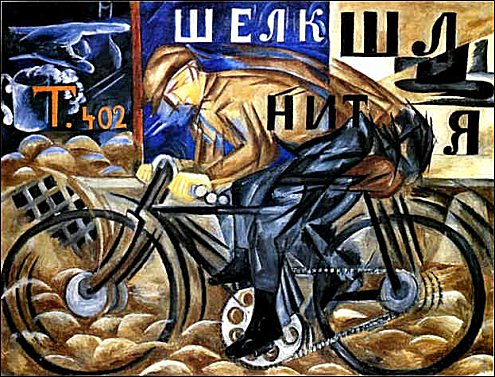
A century after the launching of the first Futurist manifesto in 1909, and 65 years since Marinetti’s death on December 2, 1944, Futurism seems to be the one avant-garde movement that was most successful in enduringly inspiring artists and writers around the world and in thus bridging the gap between theory and praxis. This conference aims at a better/deeper understanding of Futurism’s significance by focusing on the (relative) innovative qualities of the movement (Precursors), lesser-known actual Futurist projects and careers (Protagonists) and its lasting cultural and political relevance (Legacies).
Like most avant-garde movements Futurism suggested to present a clear break with the art and ideas of the past. Yet many of its defining characteristics can be traced to earlier movements, artists and currents. Futurism’s defining forwards looking rhetoric tended to obscure these relationships as well as its own regressive character. The Precursors-segment of the conference will try to address these issues.
The canon of Futurist works and artists is fairly limited. The scope of the movement has been demonstrated in major exhibitions (catalogues), but many major works, concepts and careers remain relatively unknown. In the Protagonist-section the conference acknowledges the diversity of the Futurist project by showing, analyzing and discussing contributions that even most specialists, scholars and curators tend to leave out of the picture.
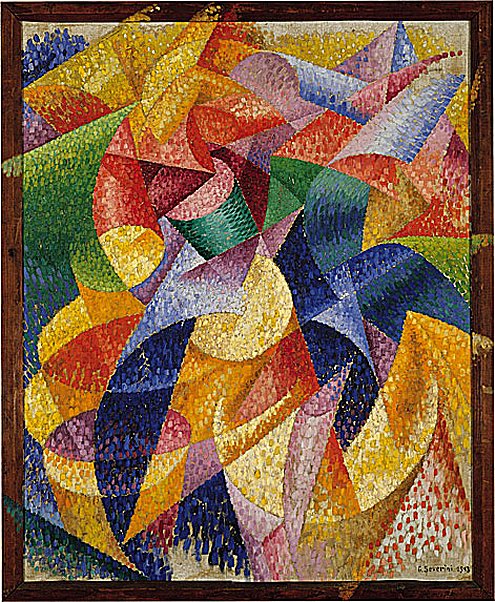
The Legacies-part deals with the heritage of Marinetti’s programme, which is overwhelmingly present, in the arts as well as in society at large. New internet applications have abolished boundaries of time and space. WiFi offers the opportunities already advocated in Marinetti’s concept of ‘wireless imagination’. Emerging young poets all over the globe engage in destroying syntax and introducing mathematical sign language, thus accomplishing on a worldwide scale Marinetti’s Futurist poetics of telegraphic language. After the success of concrete poetry and musique concrète in the 1950s, multimedia, mixed media and inter-mediality presently reign in the arts world. And also ideologically the Futurist legacy has not lost its topicality, nor its highly controversial impact, considering the re-emergence of Futurist ideas on the hygiene of war in the rhetoric on the war on terror.
Futurism’s presence in today’s world calls for reflection, both on the topicality of the futurist legacy during the past century and on its transformations. In mapping Futurism’s development and presence in technological, artistic and political terms, the conference hopes to gain better understanding of the movement’s legacy as well as of the cultural dynamics of transgression vs regression which in the long run determines Futurism’s lasting success.
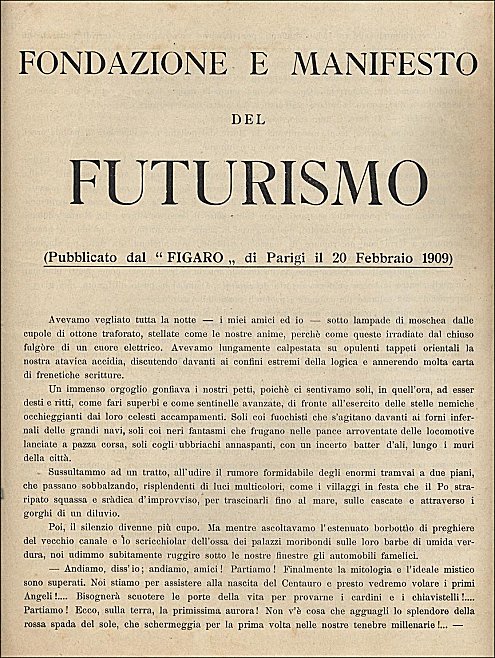
Futurisms – Precursors, Protagonists, Legacies
Utrecht University
International conference
1 – 3 December 2009
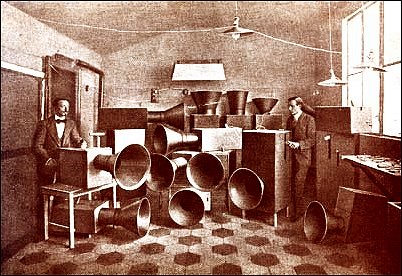
Confirmed keynote speakers: Günter Berghaus (Bristol University), Giovanni Lista (CNRS, Paris), Marjorie Perloff (Stanford University) and Jeffrey Schnapp (Stanford University); confirmed invited speakers are Walter Adamson (Amory University, Atlanta), Timothy Campbell (Cornell University), Silvia Contarini (Paris-X Nanterre) and Luca Somigli (Toronto University).
Organisors: Geert Buelens (chair of modern Dutch literature, University of Utrecht), Harald Hendrix (chair of Italian Studies, University of Utrecht), Monica Jansen (assistant professor in Italian Studies, Universities of Utrecht and Antwerp) and Wanda Strauven (associate professor in Film Studies, University of Amsterdam).
Conference website: www.hum.uu.nl/futurisms
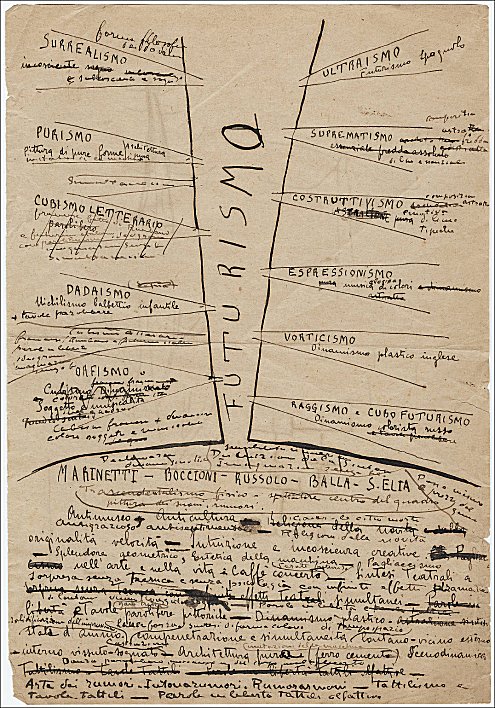
FLEURSDUMAL.NL MAGAZINE
More in: Futurism
Thank you for reading Fleurs du Mal - magazine for art & literature